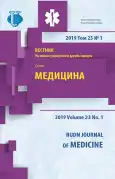MATHEMATICAL MODELING AND CONTROL OF HIV INFECTION DYNAMICS TAKING INTO ACCOUNT HORMONAL REGULATION
- Authors: Savinkova A.A.1, Savinkov R.S.1,2, Bakhmetyev B.A.3, Bocharov G.A.1
-
Affiliations:
- Marchuk Institute of Numerical Mathematics of the Russian Academy of Sciences
- Peoples’ Friendship University of Russia
- Department of Immunology, Institute of Ecology and Genetics of Microorganisms of the Russian Academy of Sciences
- Issue: Vol 23, No 1 (2019)
- Pages: 79-103
- Section: IMMUNOLOGY. ALLERGOLOGY
- URL: https://journal-vniispk.ru/2313-0245/article/view/345308
- DOI: https://doi.org/10.22363/2313-0245-2019-23-1-79-103
- ID: 345308
Cite item
Full Text
Abstract
Aims: The problem of effective treatment of HIV-infected patients is an important task of clinical virology and immunology due to the high cost of drugs, the presence of side effects and the need for strict adherence to the schedule of drug intake for patients. Therefore, the urgent task is to develop new approaches to optimize the use of antiretroviral therapy to reduce the cost of treatment and to improve the quality of life for patients. The tasks are addressed to test the hypothesis that the system of therapeutic interruptions in the treatment of HIV infection can give better results (both the duration and comfort of the patient’s life, and the need for fewer drugs) compared with regular medication in standard doses. Methods: In this work, an extended version of the mathematical model of the immune response in HIV infection (proposed in Hadjiandreou et al., 2009) was constructed to take into account the hormonal regulation of the immune response and the impact of antiretroviral drugs on the course of the disease, the calibration of the parameters of the resulting model to match the actual trends of the disease and the search for an optimal treatment strategy. The model is formulated as a system of ordinary differential equations. The therapy optimization is modeled following the structured treatment interruptionapproach using the methods of simulated annealing and the simplex method. The mathematical model and optimization methods are implemented in C ++. Results: It has been shown that in treating HIV-infected patients, it is possible to significantly (up to 3 times) reduce the total amount of required medications simultaneously with an increase in the duration of the period with a high quality of life (due to reducing the intensity of side effects) during antiretroviral therapy. Conclusion: The use of mathematical models and optimization methods opens up the possibility for the implementation of personalized approaches to the treatment of HIV infection, taking into account the side effects, the hormonal status of patients and the cost of drugs.
Keywords
About the authors
A. A. Savinkova
Marchuk Institute of Numerical Mathematics of the Russian Academy of Sciences
Author for correspondence.
Email: bocharov@m.inm.ras.ru
Moscow, Russia
R. S. Savinkov
Marchuk Institute of Numerical Mathematics of the Russian Academy of Sciences; Peoples’ Friendship University of Russia
Email: bocharov@m.inm.ras.ru
Moscow, Russia
B. A. Bakhmetyev
Department of Immunology, Institute of Ecology and Genetics of Microorganisms of the Russian Academy of Sciences
Email: bocharov@m.inm.ras.ru
Perm, Russia
G. A. Bocharov
Marchuk Institute of Numerical Mathematics of the Russian Academy of Sciences
Email: bocharov@m.inm.ras.ru
Moscow, Russia
References
- Chereshnev V.A., Bocharov G.A., Kim A.V., Bazhan S.I., Gaynova I.A., Krasovsky A.N., Shmagel N.G., Ivanov A.V., Safronov M.A., Tretyakov R.M. Introduction to the tasks of modeling and managing the dynamics of HIV infection. Moscow; Izhevsk: Institute for Computer Studies, 2016.
- Marios M. Hadjiandreou, Raul Conejeros, Ian Wilson. HIV treatment planning on a case-by-case basis. World Academy of Science, Engineering and Technology. Vol. 3. 2009-08-25.
- Klaus Kapelari, Christine Kirchlechner, Wolfgang Högler, Katharina Schweitzer, Irene Virgolini, Roy Moncayo. Pediatric reference intervals for thyroid hormone levels from birth to adulthood: a retrospective study. BMC Endocrine Disorders 27 November 2008.
- Rosen V.B. Basics of Endocrinology: Textbook. 3rd ed. Moscow: Publishing House of Moscow State University, 1994. 384 p.
- William M. Kettayl, Ronald A. Arches. Pathophysiology of the endocrine system. Per from English. SPb.; M.: Nevsky dialect; Publishing house “BINOM”, 2001. 336 p.
- Usova N.N. Iodine-containing thyroid hormones and their effect on the nervous system. Medical news. 2012. № 4.
- Zabelina V.D. [and others]. Problems of endocrinology. 2000. Vol. 45, No 4. P. 10-14.
- Semenyenya I.N. Successes fiziol. sciences. 2004. V. 35, No 2. P. 41-56.
- Diseases of the thyroid gland. Ed. L.I. Bramerman. Moscow: Medicine, 2000. 432 p.
- Vasilyeva E.M., Bakanov M.I. Biomed. chemistry. 2005. Vol. 51, No. 6. P. 581-602.
- Panos Macheras, Athanassios Iliadis. Modeling in Biopharmaceutics, Pharmacokinetics, and Pharmacodynamics. Springer, Heidelberg, 2006.
- Süli Endre, Mayers David (2003). Cambridge University Press.
- Kirkpatrick S., Gelatt Jr C.D., Vecchi M.P. (1983). Optimization by Simulated Annealing. Science. 220 (4598): 671-680.
- Slavyanskaya T.A., Sepiashvili R.I. Role of Cytokines in Immunopathology. Allergology and Immunology. 2005. Vol. 6, No 2. P. 42.
Supplementary files









